Menopause is inevitable, but weight gain isn't. To maintain a waistline that doesn't increase with your age, continue reading.
RELATED: How Your Body Changes When You Turn 50
How to Deal With Menopause Weight Gain
Click here to jump to the instructographic.
7 Ways to Stave off Menopause Weight Gain
1. Ketogenic Diet to Slow Menopause Weight Gain
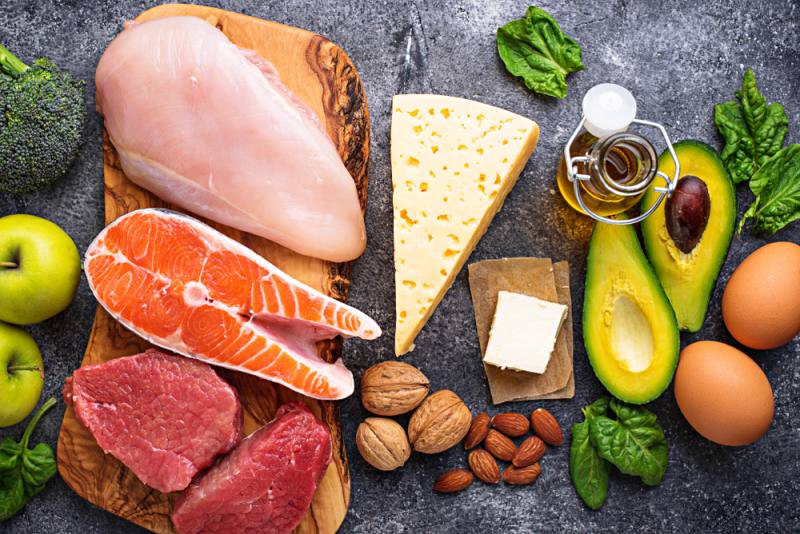
A ketogenic diet may help counter insulin resistance.
The researchers found that both diets can boost weight loss and lower blood sugar levels. But the LC diet was far more effective in:
- improving lipid profile
- blood glucose stability
- reduction in diabetes medication
They say that the LC diet may help manage type 2 diabetes, which is characterized by—you guessed it—insulin resistance.
How does this work?
Glucose is a sugar that comes from carbohydrates. When you consume fewer carbs, there's a lesser need for insulin. And following the mutual relationship between insulin and estrogen may help stabilize estrogen levels.
Another study agrees with the results, citing that a reduced-carb diet may lower the risk of postmenopausal weight gain.
But at the end of the day, it's not a one-size-fits-all situation. A ketogenic diet may not be realistic or ideal for you. But the key takeaway is that a low-carb diet may be a wise decision.
Proper nutrition and mindful eating are vital factors in weight loss success stories.
2. Watch (And List) What You Eat
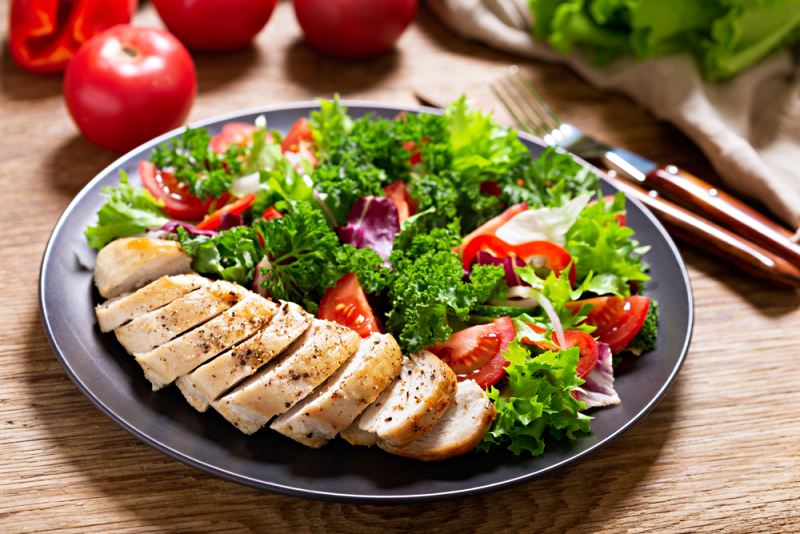
In addition to cutting back on carbs, eat within your calorie limits.
Losing weight is a matter of burning more calories than you consume. Compute your daily limit and plan your meals ahead of time.
Calories get a bad rep, but they're crucial in giving your body the energy it needs. Instead of worrying about driving down your calories, make sure each calorie counts.
A nutritious meal incorporates:
- fruits
- vegetables
- whole grains
- protein foods
- dairy
Your meals should contain all the essential vitamins and minerals you need to promote optimal health and support body functions. Choose the healthiest choices for you. And this may mean choosing between a slice of chocolate cake or a fiber- and mineral-rich whole grain bread. (The better choice is the whole grain bread, by the way.)
Fruit juices are a sneaky “health” drink that is actually full of refined sugars. If you want a citrusy drink, have it freshly made.
It may also be helpful to list down everything you're eating. It will help you keep track of you're making healthy choices, and if you're getting all the nutrients you need.
You may discover that you started the day strong with a bowl of oatmeal with blueberries and a glass of milk in the morning. However, you felt stressed and snacked on one too many packs of sweets towards the end of the day.
A food journal may bring to light unhealthy food choices that need addressing.
3. Eat on Time
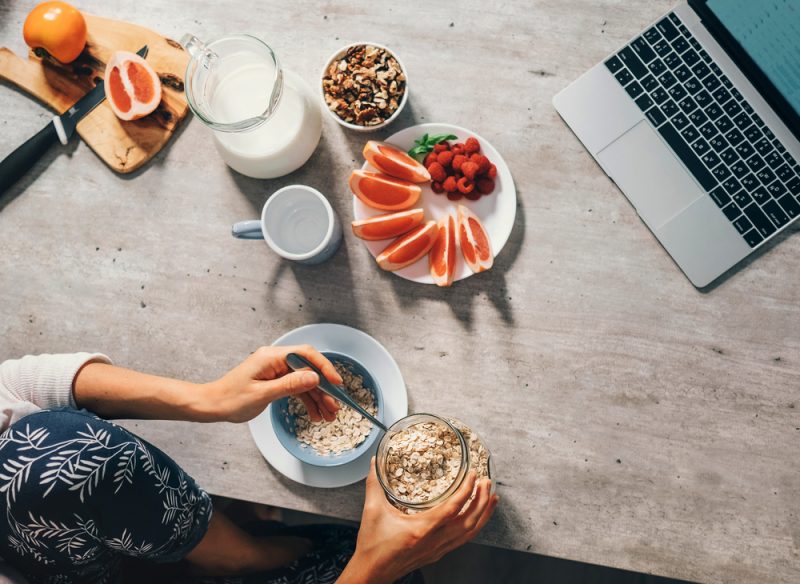
Have your heavier meals at the start of the day. This is when your body needs the most energy. It may also give you enough time to zap those calories before bedtime.
Enjoy small but frequent meals throughout the day. This may help sustain you with the energy you need without leaving you hungry and then overeating.
4. Exercise for Menopause Weight Gain

Young or young-at-heart, everyone can benefit from exercise. As your body composition changes during menopause, there are ways to counteract their effects.
Muscle mass may lower as you age, and exercise could combat that. With a higher muscle mass comes a potentially speedier metabolism. As a result, building more muscle may also help you zap more calories even at rest.
The Centers for Disease Control and Prevention (CDC) recommends that adults get 150 minutes of exercise a week. It may seem daunting, but you can stretch this throughout the week.
If your schedule is packed, do 10-minute sessions in the morning, afternoon, and when you get home. Follow this routine five times a week, and you'll fulfill the recommended 150 minutes.
But especially for those that do not have experience working out, it may seem difficult—even unrealistic.
Ultimately, you need to move.
5. Move More, Staying Vertical

Do what you can to squeeze in a bit more physical activity in your day.
According to the CDC, walking fast and pushing a lawnmower across your yard could count as a moderate-intensity workout. Making simple lifestyle choices like choosing the stairs over the elevator may also contribute to a smaller waistline.
Take a walk in the park on your way home. Maybe even take your bike to work instead of the bus.
Stand tall and proud. And keep standing—it may also help with menopause weight gain.
A 2017 study found that sitting down for extended periods may be connected to weight gain around the belly. While staying on your feet isn't equivalent to a workout, it might be a better choice over sitting.
Do small chores every hour, anything to get off your seat for a while. Wash the dishes or brew a cup of joe.
Have you ever considered purchasing a standing desk? It might sound like a foot ache waiting to happen, but it could take a load off of your upper back up to your neck.
Again, it's no HIIT workout. But making a habit of healthier decisions such as this could lead to a more active lifestyle. And this could translate to your waistline.
6. Call a Friend

A good friend can help share your burden when the effort to stop weight gain is weighing on you emotionally.
Lifestyle changes needed to adjust to your aging body can be overwhelming. But having a friend you can share your feelings with helps lighten the load.
And when that load is a 5 kg dumbbell on your workout sessions, your friend could help distract you from the fatigue too.
Exercising with a friend may make the task seem more fun. It can also distract you from other negative emotions you may be feeling. You'll be through with your routine before you get to the latest gossip.
But your best friend in your later years will be your doctor.
7. Phone a Doctor

Everyone's body is different. Your doctor can help you fine-tune your diet and lifestyle to get you in the best shape (and waistline).
A doctor may also help you deal with other changes and symptoms that come with menopause.
RELATED: Healthy Eating After 50 | Changes You Need To Make In Your Diet
Menopause Weight Gain | Your Hormones, Insulin Resistance, and Belly Fat

During menopause, your body doesn't produce as much estrogen as in your reproductive years. And one study points out that with lower estrogen comes insulin resistance.
Insulin is a vital factor in weight gain. Insulin is in charge of:
- regulating your blood sugar level
- getting energy (in the form of glucose) to your body's cells
- storing excess glucose for later
But when your body doesn't use insulin effectively, you call it insulin resistance. As a result, people with insulin resistance have higher blood sugar (glucose) levels. And because insulin's ability to store glucose is impaired, you may end up getting gaining weight.
And what does this mean for women?
During menopause, your estrogen levels drop. And as the study discovered, this may come in duet with insulin resistance. With insulin resistance may come a higher likelihood of weight gain.
And one study found suggests that for women, this weight gain could center around the belly.
While weight gain is more common for older women, hormones can't get all the blame. While the body changes composition during menopause, it isn't the only suspect for weight gain.
Other Possible Causes of Weight Gain during Menopause

A host of factors could also contribute to weight gain in your older years.
- sedentary lifestyle
- little to no exercise
- less muscle mass
- slower metabolism
- genetics
- lack of sleep
Should I Be Concerned about Menopause Weight Gain?

Unhealthy weight gain could be harmful. And it's not just for women.
It may lead to conditions like:
- breathing problems
- heart disease
- vascular disease
- type 2 diabetes
It may lead to other consequences that could lower your quality of life. So if you feel that you're trousers are starting to feel tighter, it may be time to reevaluate your habits.

Check out this video to learn how eating may actually slim your waistline:
Menopause weight gain is common and avoidable. It takes simple yet transformative lifestyle modifications to trim your belly fat. Focus on your eating and lifestyle habits. Eat right and within your caloric limit. When it comes to physical activity, move more!
Do you have your own secrets and tricks to flatten your belly? Let us know in the comments section below!
- 9 Great Ways to Lose Weight After 40
- 13 Anti Aging Foods To Add To Your Diet Now
- 17 Foods to Lower High Blood Pressure Without Medication
Please stay connected with us on Facebook, Twitter, Instagram, and Pinterest, and make sure to join our community of healthy living and minded people here.
Trending
Best Multivitamin for Men | Top 10 Best Multivitamins for Men 2022
Tongue Color | 7 Scary Tongue Color Meanings
Get Updates
SIGN UP FOR OUR NEWSLETTER TODAY
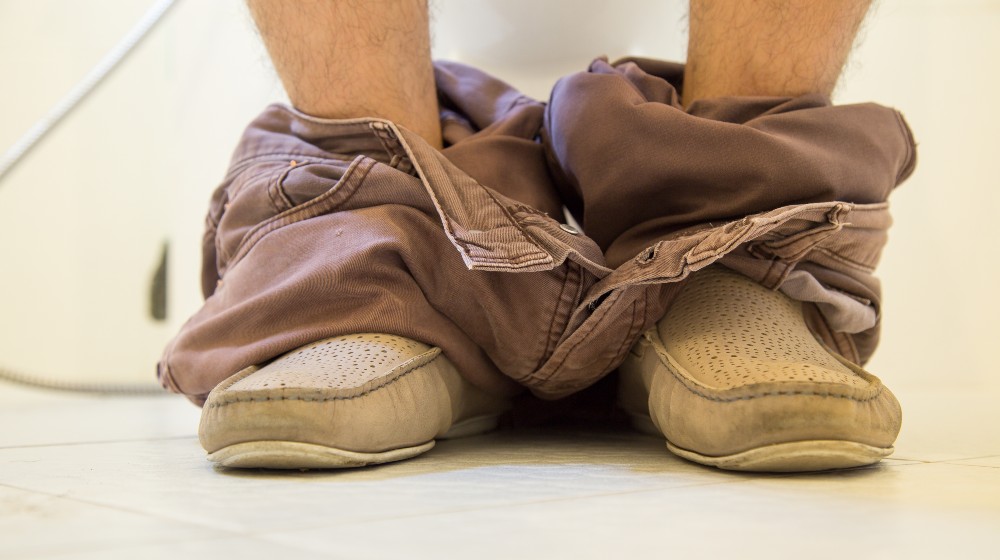
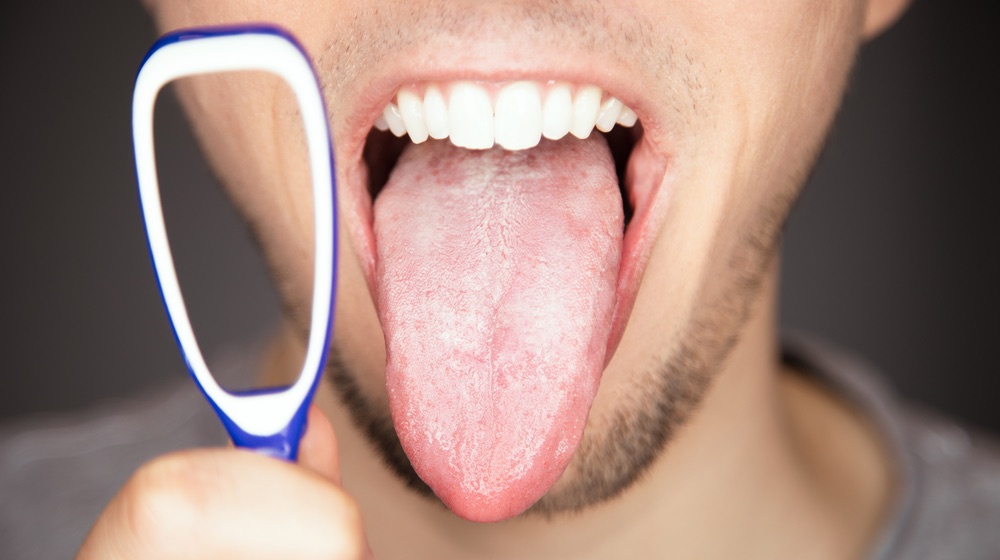
Tongue Color | 7 Scary Tongue Color Meanings

